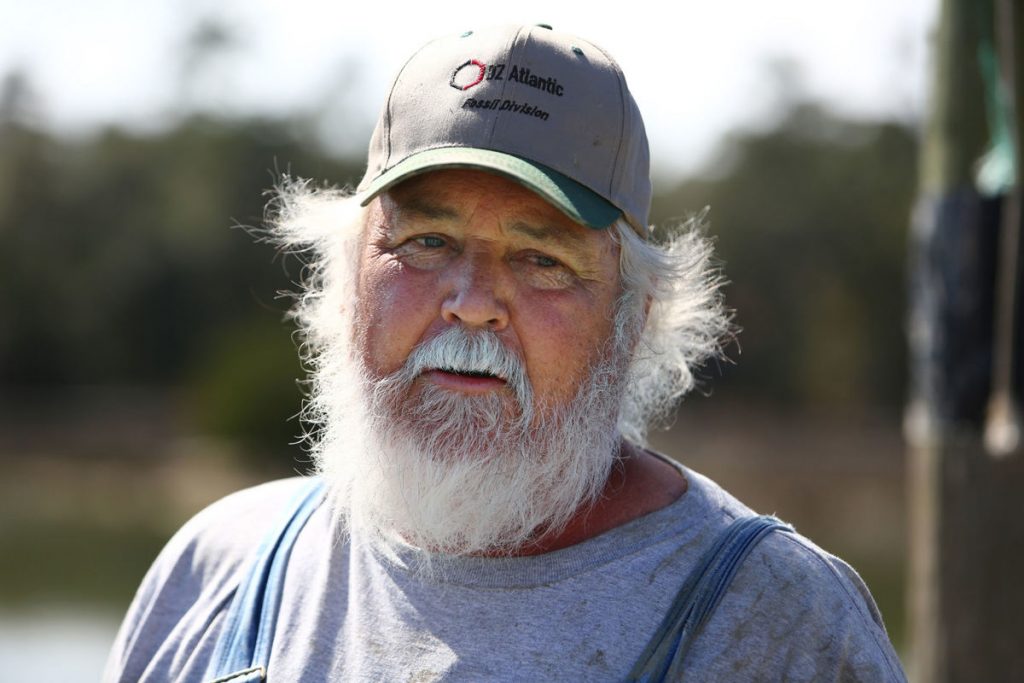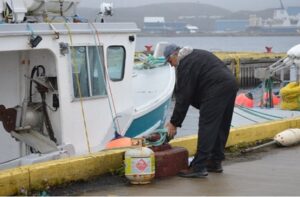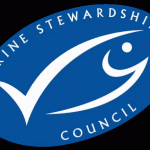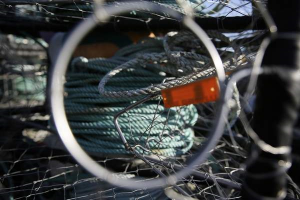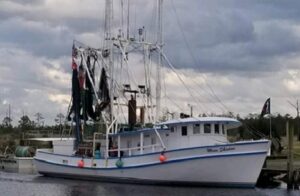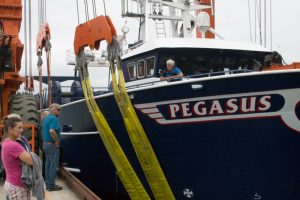Tag Archives: Molly Lutcavage
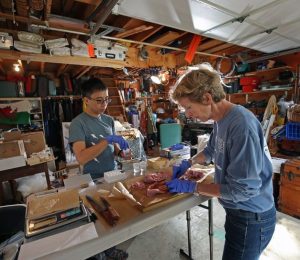
In her garage lab, a scientist looks for answers about skinny tuna
Molly Lutcavage is standing on the State Fish Pier in Gloucester, watching a crane hoist a giant bluefin tuna off the back of a fishing boat. “Look at how skinny she is,” the fisherman, Corky Decker, yells up to her. “That’s how they’ve all been — long, ugly things like you’d catch in June.” Lutcavage nods at the fish, which is 74 inches long but weighs just 174 pounds — very skinny indeed for a tuna — then looks down at the plastic bag in her hands, which is what she’s come for. It contains the tuna’s ovaries,,, >click to read< 07:38
Fish fight: Scientists battle over the true harm of mercury in tuna
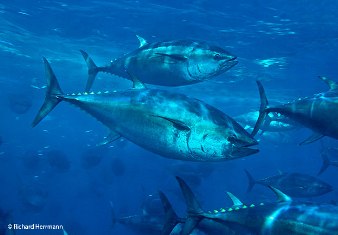 Molly Lutcavage thought she had a deal. For more than a decade, she had collected hundreds of tissue samples from bluefin tuna in hopes of settling a question that has long vexed pregnant women and the parents of young children: Should they eat the big fish, a beneficial source of protein and fatty acids? Or did mercury contamination make them too dangerous? Lutcavage hoped to test the theory that selenium, a key chemical found in tuna, prevents mercury from being transferred to the people who eat them and that, therefore, the fish are safe to eat. So she gave her hard-won samples to a colleague, Nick Fisher, to analyze in his lab. But Fisher, it seems, didn’t have as much interest in Lutcavage’s selenium theory. Two years later, he produced a study focused almost exclusively on his own hypothesis: that lowering pollution emissions from power plants reduced the levels of mercury in bluefin tuna. Lutcavage was furious, and the two scientists went to war. continue reading the article here 14:55
Molly Lutcavage thought she had a deal. For more than a decade, she had collected hundreds of tissue samples from bluefin tuna in hopes of settling a question that has long vexed pregnant women and the parents of young children: Should they eat the big fish, a beneficial source of protein and fatty acids? Or did mercury contamination make them too dangerous? Lutcavage hoped to test the theory that selenium, a key chemical found in tuna, prevents mercury from being transferred to the people who eat them and that, therefore, the fish are safe to eat. So she gave her hard-won samples to a colleague, Nick Fisher, to analyze in his lab. But Fisher, it seems, didn’t have as much interest in Lutcavage’s selenium theory. Two years later, he produced a study focused almost exclusively on his own hypothesis: that lowering pollution emissions from power plants reduced the levels of mercury in bluefin tuna. Lutcavage was furious, and the two scientists went to war. continue reading the article here 14:55
How In Trouble Are Bluefin Tuna, Really? Controversial Study Makes Waves with Enviro’s
 A group of scientists is now making the case that Atlantic bluefin may be more resilient to fishing than commonly thought — and perhaps better able to rebound from the species’ depleted state. But the study is controversial. Several tuna researchers we spoke with warned that the results are preliminary, and it’s much too soon to use them to guide how fisheries are managed. In an email exchange with The Salt, Safina writes, “[T]heir main concern is not recovery, not conservation, but how their findings can allow additional exploitation and more stress to be inflicted on a very beleaguered creature.” Read the article here 08:10
A group of scientists is now making the case that Atlantic bluefin may be more resilient to fishing than commonly thought — and perhaps better able to rebound from the species’ depleted state. But the study is controversial. Several tuna researchers we spoke with warned that the results are preliminary, and it’s much too soon to use them to guide how fisheries are managed. In an email exchange with The Salt, Safina writes, “[T]heir main concern is not recovery, not conservation, but how their findings can allow additional exploitation and more stress to be inflicted on a very beleaguered creature.” Read the article here 08:10
Large Pelagics Research Center and “Wicked Tuna”s Captain Bill “Hollywood” Muniz – Tracking Atlantic Bluefin Tuna
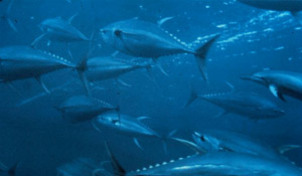 Large Pelagics Research Center, Molly Lutcavage’s Gloucester-based research team will collaborate with long-term tuna research partners and stars of television’s “Wicked Tuna” series, Captain Bill “Hollywood” Muniz and his spotter, Mark Brochu. Wayne Perryman, leader of a NOAA project using hexacopters to study killer whales off the coast of British Columbia, is advising the UMass Amherst group on this project. Read the rest here 09:55
Large Pelagics Research Center, Molly Lutcavage’s Gloucester-based research team will collaborate with long-term tuna research partners and stars of television’s “Wicked Tuna” series, Captain Bill “Hollywood” Muniz and his spotter, Mark Brochu. Wayne Perryman, leader of a NOAA project using hexacopters to study killer whales off the coast of British Columbia, is advising the UMass Amherst group on this project. Read the rest here 09:55
Study of bigeye tuna in Northwest Atlantic uses new tracking methods
 A first-of-its-kind study of bigeye tuna movements in the northwestern Atlantic Ocean led by Molly Lutcavage, director of the Large Pelagics Research Center at the University of Massachusetts Amherst, found among other things that these fish cover a wide geographical range with pronounced north-south movements from Georges Bank to the Brazilian shelf, and they favor a high-use area off Cape Hatteras southwest of Bermuda for foraging. Read more here 07:52
A first-of-its-kind study of bigeye tuna movements in the northwestern Atlantic Ocean led by Molly Lutcavage, director of the Large Pelagics Research Center at the University of Massachusetts Amherst, found among other things that these fish cover a wide geographical range with pronounced north-south movements from Georges Bank to the Brazilian shelf, and they favor a high-use area off Cape Hatteras southwest of Bermuda for foraging. Read more here 07:52
Fish science on table in Pelagics series
![]() They’ll be talking fish and fisheries at Maritime Gloucester on Thursday nights throughout the month of April during the speaker series presented by the Large Pelagics Research Center of the University of Massachusetts at Amherst. Read more here 07:20
They’ll be talking fish and fisheries at Maritime Gloucester on Thursday nights throughout the month of April during the speaker series presented by the Large Pelagics Research Center of the University of Massachusetts at Amherst. Read more here 07:20
Study: Leatherbacks stay near Cape
 With a blunt nose and arched shell, up to 8 feet in length and weighing 2,000 pounds, a leatherback turtle is the marine equivalent of a Volkswagen Beetle. Propelled through the water by enormous front flippers, leatherbacks,, Read more here capecodonline 05:23
With a blunt nose and arched shell, up to 8 feet in length and weighing 2,000 pounds, a leatherback turtle is the marine equivalent of a Volkswagen Beetle. Propelled through the water by enormous front flippers, leatherbacks,, Read more here capecodonline 05:23
Tracking endangered leatherback sea turtles by satellite, key habitats identified
 The study, part of doctoral research by Kara Dodge supervised by her advisor, Molly Lutcavage of the University of Massachusetts Amherst’s Large Pelagics Research Center (LPRC) in Gloucester, followed leatherbacks in their northern US feeding grounds. Read more here sciencedaily 08:16
The study, part of doctoral research by Kara Dodge supervised by her advisor, Molly Lutcavage of the University of Massachusetts Amherst’s Large Pelagics Research Center (LPRC) in Gloucester, followed leatherbacks in their northern US feeding grounds. Read more here sciencedaily 08:16



































